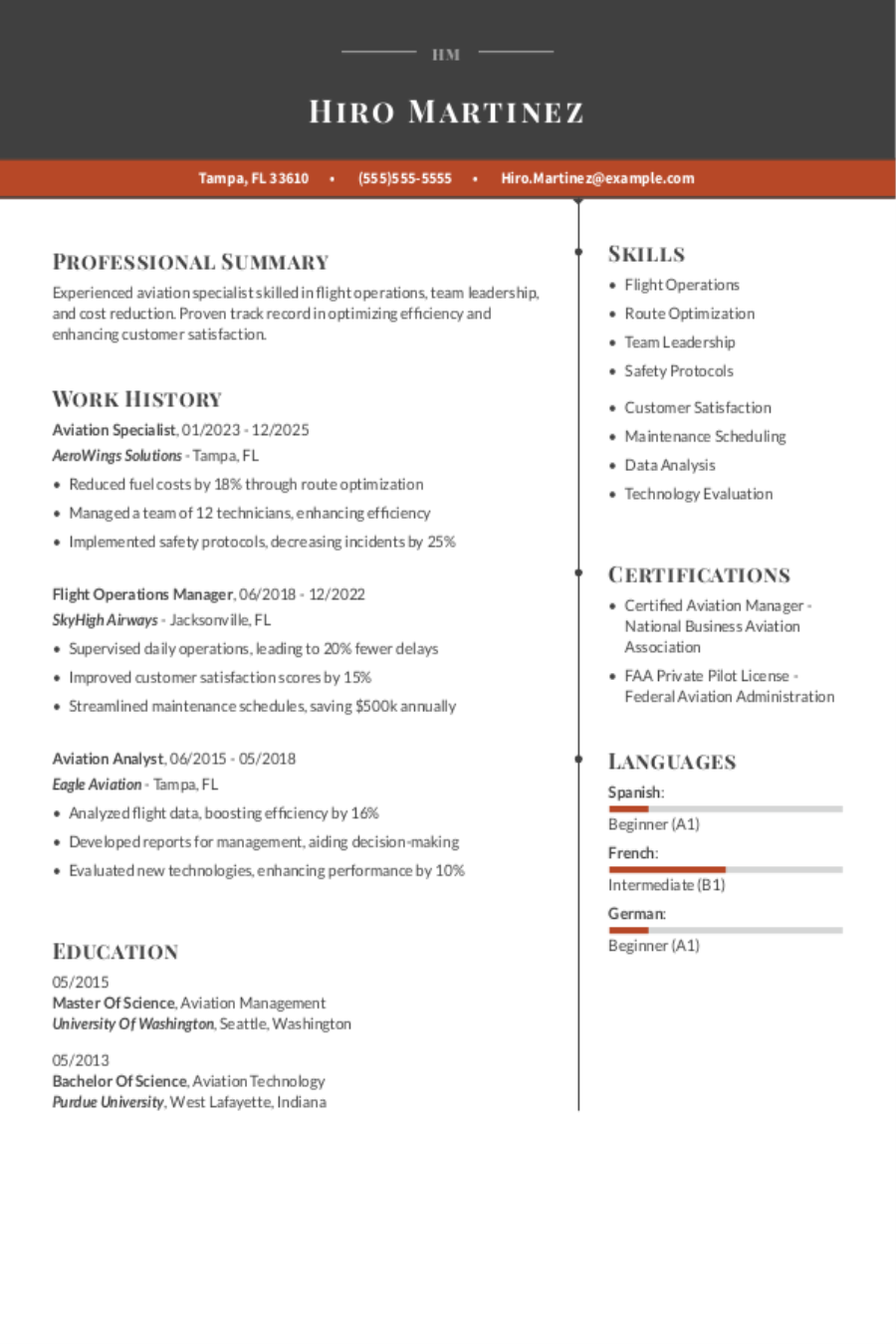Popular Economist Resume Examples
Entry-level economist resume
An entry-level resume for an economist should focus on academic achievements, relevant internships, research skills, analytical abilities, and skill in statistical software to demonstrate potential contributions despite limited experience.
Emphasizes soft skills: This resume effectively highlights the job seeker's strong analytical skills and ability to lead teams, which compensate for limited experience.
Focuses on goals: The resume reflects a strong commitment to professional development, showcasing achievements in economic analysis and forecasting, while actively participating in relevant community and academic initiatives to improve expertise in the field.
Mid-career economist resume
A mid-career economist resume should emphasize a combination of relevant analytical experience, key economic skills, and evidence of professional growth to attract potential employers in the field.
Balances skills and experience: This job seeker's resume effectively showcases a mix of advanced analytical skills and progressive experience, demonstrating their journey from junior market researcher to economist while achieving measurable impacts in each role.
Includes mix of skills: This resume effectively balances hard skills like data analysis and economic forecasting with soft skills such as collaboration and communication, highlighting the applicant's comprehensive expertise in economics.
Experienced economist resume
An experienced economist's resume should highlight key achievements and analytical skills in a straightforward manner to effectively demonstrate their contributions and growth in the field.
Optimized for ATS: The resume uses a clear and professional template that features an elegant header paired with an ATS-friendly resume format, ensuring optimal visibility to both recruiters and automated screening systems.
Follows traditional format: The chronological resume format effectively showcases this job seeker's extensive experience by presenting a clear timeline of roles and achievements, making it easy for readers to track their career development and contributions.
No experience economist resume
A resume for an applicant with no experience aspiring to be an economist should highlight strong analytical skills and relevant academic achievements to showcase the applicant’s potential.
Uses a simple style: The resume's straightforward layout effectively highlights qualifications, ensuring the job seeker's analytical experience and academic achievements stand out clearly.
Overcomes lacking experience: Highlighting volunteer work related to economic analysis illustrates the applicant's economic expertise, effectively bridging the gap created by limited professional experience.
More resume examples
Economist Resume Template
Looking to showcase your skills and experience? Use this economist resume template as a solid foundation—simply personalize it with your unique details.
John Huang
Chicago, IL 60617
(555)555-5555
John.Huang@example.com
Professional Summary
Dynamic economist adept in analysis, forecasting, and modeling. Proven success in enhancing efficiency by 20% and reducing costs by $500K.
Work History
Economist
Global Economic Insights - Chicago, IL
June 2023 - October 2025
- Led data analysis increasing efficiency by 20%
- Forecasted economic trends reducing costs by $500K
- Implemented models boosting prediction accuracy by 15%
Economic Analyst
Quantitative Solutions Ltd. - Chicago, IL
January 2020 - May 2023
- Conducted market research enhancing customer insight
- Generated reports improving strategy effectiveness by 25%
- Developed indices for tracking GDP growth trends
Financial Economist
Future Finance Group - Springfield, IL
January 2017 - December 2019
- Managed budget projections cutting expenses by 15%
- Optimized financial models increasing ROI by 10%
- Led portfolio assessments reducing risks by 30%
Skills
- Data Analysis
- Economic Forecasting
- Statistical Modeling
- Market Research
- Quantitative Analysis
- Financial Modeling
- Econometrics
- Predictive Analytics
Education
Master of Science Economics
Harvard University Cambridge, MA
May 2016
Bachelor of Arts Economics
Yale University New Haven, CT
May 2014
Certifications
- Certified Economic Analyst - Economic Certification Board
- Advanced Data Science - Data Science Institute
Languages
- Spanish - Beginner (A1)
- French - Intermediate (B1)
- Mandarin - Beginner (A1)
Must-Have Skills on a Economist Resume
A strong skills section is essential for showcasing your qualifications on a resume.
Professionals in finance, banking, and insurance play a crucial role in maintaining trust and stability. The skills you highlight should reflect your ability to support accurate, efficient operations and contribute to sound decision-making. This section is your chance to show how you help safeguard and advance organizational goals.
The following data highlights the most common hard and soft skills for an economist based on Resume Now’s internal resume data.
When you're ready to improve your resume with these skills, consider using our AI Resume Skills Generator. It suggests both hard and soft skills tailored to your job title, enabling you to create a comprehensive and personalized skill set.
Writing Your Economist Resume
Having explored these effective resume examples, you are now prepared to dive into the intricacies of how to write a resume. We will support you through each section, ensuring you understand every detail along the way.
List your most relevant skills
An effective skills section on your economist resume should clearly showcase both your analytical abilities and technical proficiencies. Highlight skills such as data analysis, economic modeling, and statistical software familiarity.
Using relevant keywords from the job listing not only resonates with human readers but also improves your visibility within applicant tracking systems. Be sure to review the job description carefully and tailor your skills section to reflect the specific requirements mentioned. This shows that you understand the role and are well-prepared for it.
Example of skills on an economist resume
- Proficient in analyzing economic data to identify trends and patterns
- Adept at developing economic models for forecasting and policy evaluation
- Strong communicator with the ability to present complex information clearly
- Collaborative team player focused on achieving shared goals
Highlighting your soft skills on your resume can set you apart from other job seekers. Because they are challenging to teach, employers often prioritize interpersonal abilities, making them a valuable asset in any role.
Highlight your work history
Your work experience section should showcase how you've applied analytical skills to deliver significant results, incorporating relevant keywords that align with the expectations of potential employers.
In each job entry, include essential details such as your title, the employer's name, and the dates of employment. This information is important for establishing professional credibility and helps employers quickly assess your experience in the field of economics.
Example of an economist work experience entry
- Economist
Global Economic Research Institute - Washington, DC
June 2018 - Present - Conduct in-depth analyses of economic trends and data, providing actionable insights that informed policy recommendations for government agencies
- Develop econometric models to forecast economic conditions, improving prediction accuracy by 15% over previous methodologies
- Collaborate with cross-functional teams to prepare comprehensive reports and presentations on economic issues for stakeholders and policymakers
- Mentor junior economists in research techniques and data analysis, improving team productivity and skill development through targeted training sessions
- Represent the organization at national conferences, sharing research findings that contributed to shaping public discourse on economic policy
Aim for clarity and impact in your resume bullet points. Use concise phrases that highlight your key achievements without unnecessary fluff, ensuring each point conveys a clear value you brought to previous roles.
Include your education
The education section of your economist resume should list your academic credentials in reverse-chronological order, starting with your most recent degree. Include all relevant degrees and diplomas while leaving off your high school diploma if you have a bachelor's degree or higher.
For individuals currently pursuing a degree or those with incomplete education, it is advisable to note the highest completed level along with an expected graduation date. Including bullet points that detail relevant coursework or academic achievements can be beneficial for recent graduates or current students as it shows their educational background and expertise in economics.
Common certifications for an economist resume
- Chartered Financial Analyst (CFA) – CFA Institute
- Certified Business Economist (CBE) – National Association for Business Economics (NABE)
- Financial Risk Manager (FRM) – Global Association of Risk Professionals (GARP)
- Certified Economic Development (CEcD) – International Economic Development Council (IEDC)
Sum up your resume with an introduction
Your resume profile is your first chance to make a strong impression on potential employers. It acts as a powerful introduction, encapsulating your skills, experiences, and career goals in just a few sentences.
For seasoned applicants, a professional summary is ideal. It allows you to showcase your most significant achievements and relevant experience right at the top of your resume. If you don't yet have much experience, include a resume objective that focuses on your aspirations and development.
Professional summary example
Analytical economist with over 8 years of experience in research and data analysis within dynamic financial environments. Proven success in delivering actionable insights that drive strategic decision-making and improve economic forecasting accuracy. Highly proficient in econometric modeling, statistical analysis, and market trend evaluation.
Resume objective example
Enthusiastic economist eager to use analytical skills and economic modeling expertise to support data-driven decision-making within a forward-thinking organization. Aiming to contribute fresh insights and improve research efforts through strong problem-solving abilities and attention to detail.
To create an effective resume profile, start by including your job title as an economist. This method quickly communicates your professional identity to employers, helping them recognize your skills and the value you offer.
Add unique sections to set you apart
Improve your resume by including optional sections that highlight your unique qualifications for economist positions. These sections allow you to stand out by showcasing what makes you a distinctive job seeker.
Consider adding details about relevant hobbies and volunteer experiences. This not only illustrates your personal interests but also demonstrates skills and values that align with the role. Employers appreciate seeing how you apply economic principles in real-world situations or community initiatives, as it provides insights into your values and commitment beyond traditional job responsibilities.
Three sections perfect for a economist resume
- Languages: As an economist, strong communication skills are essential for presenting complex data. If you speak additional languages, highlight your language skills on your resume to improve your ability to collaborate globally and access diverse markets.
- Volunteer Work: Including volunteer work on a resume not only showcases your skills but also demonstrates your dedication to community service. It adds depth to your professional profile, reflecting your values and commitment to making a difference.
- Accomplishments: As an economist, quantifiable accomplishments validate your analytical prowess and impact. Showcase these achievements by integrating them into your work experience section or by creating a dedicated accomplishments section.
5 Resume Formatting Tips
- Choose a format that matches your career stage.
Choose a resume format that best reflects your experience as an economist. If you have substantial professional experience, a chronological format emphasizes your career history. For those entering the field, a functional format highlights your skills. Alternatively, consider a combination resume for greater adaptability.
- Pick a smart resume template.
Using a professional resume template improves readability and simplifies formatting. A well-structured template helps your accomplishments stand out, making it easier for hiring managers to quickly grasp your qualifications. If you opt for a custom design, ensure it remains clear and uses ATS-friendly fonts to improve your chances of passing initial screenings.
- Select an appropriate font.
To improve readability and impact, select a clean, professional font for your resume. Fonts like Helvetica, Georgia, or Verdana are excellent choices that appeal to both ATS and hiring managers.
- Use consistent formatting.
Keep your resume neatly aligned with uniform margins. This creates a polished look that improves readability and leaves a strong impression on potential employers.
- Keep your resume to one or two pages.
When outlining your resume, remember that resumes should be one page long unless you have extensive experience. Focus on keeping your content concise and relevant to highlight your strengths effectively.
Tools for Your Job Search
Are you preparing to apply for that economist position you've been eyeing? Before submitting your application, consider using our ATS Resume Checker. This essential tool provides insights on how well your resume meets the criteria set by automated systems used by many employers for initial job seeker screening.
Looking to elevate your resume even further? Our AI Resume Builder offers tailored recommendations specifically designed for economists, along with professionally crafted templates that highlight your analytical skills and economic expertise.
Frequently Asked Questions
Last Updated: November 10, 2025
Absolutely. A cover letter is important because it provides essential context to your resume and allows you to communicate directly with employers. It’s your opportunity to express what attracts you to the economist role and demonstrate how your experience makes you an ideal applicant. So, don’t hesitate—write a cover letter that improves your application.
For a quick and effective solution, consider using our AI Cover Letter Generator. It creates tailored cover letters in minutes and offers various cover letter template options that match your resume perfectly, ensuring a polished presentation of your qualifications.
A resume is typically a concise document, usually spanning one to two pages, that highlights your skills and experiences relevant to the job you're applying for. In contrast, a CV (curriculum vitae) can extend several pages and provides an in-depth look at your academic background, research contributions, publications, and extensive professional experience.
When applying for positions in academia or specialized fields such as law or medicine, you should use a CV. If you need to create a detailed CV, our online CV Maker is an excellent resource. It offers various CV templates tailored to different industries and career levels, allowing you to craft a standout CV quickly and efficiently.
When addressing gaps on your resume, be honest about the reasons behind them. Whether you were caring for a family member or pursuing education, explain what you learned during that time. Highlight any skills or experiences gained, and then shift the focus back to your qualifications and how they align with the job you're applying for. This approach demonstrates resilience and commitment to personal growth.
Many economists begin as research assistants or analysts and can progress to senior economist roles or specialized positions by obtaining advanced degrees such as a master's or Ph.D. in economics.
To thrive as an economist, prioritize continuous learning through relevant courses and certifications. Join professional associations to network and stay informed about economic trends. Regularly read industry publications and participate in workshops or webinars to deepen your expertise and demonstrate your commitment to growth.
As an economist, showcasing your dedication to ongoing learning is vital. You should gain and list relevant certifications, highlight courses you've completed, and mention seminars you’ve attended. Additionally, include books you've read, podcasts you follow, and memberships in professional associations. These elements provide clear evidence of your commitment to staying informed about the latest trends and developments in your field.
Was this information helpful? Let us know!
Hailey is a career advice writer dedicated to helping job seekers excel in their careers.
More resources

What Is a CV? Curriculum Vitae Definition & Who Should Have One
Do you need to know what a CV stands for? We share the definit...

Hard Skills: 70+ Examples to Put on Your Resume
Hard skills are more important than ever in competitive indust...

AI Trends Heading Into 2026: Resume Now’s Year in Review
In 2025 artificial intelligence moved from buzzword to workpl...

Compliance Resume: Examples & Templates
As a compliance professional you need a resume that showcases...

Top Architecture Resume Examples & Pro Writing Tips
As an architect your resume must highlight essential skills l...

Aviation Resume: Examples & Templates
As an aviation professional you need a resume that showcases ...

